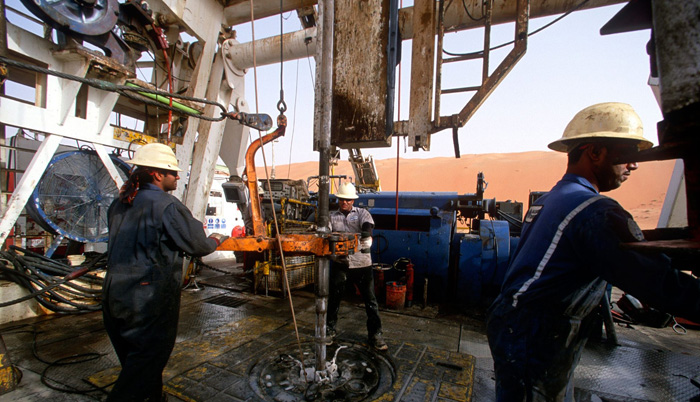![]() Home > World Business
Home > World Business
Three Years Into Cheap Oil, Gulf Is Still Depending On A Rebound

Photographer: Reza/Getty Images
![]() July 20th, 2017 | 07:26 AM |
July 20th, 2017 | 07:26 AM | ![]() 1112 views
1112 views
BLOOMBERG.COM
Energy-rich Gulf Arab nations have scrambled to adjust to the slump in oil prices since 2014. Three years on, their economies are mired in weak growth and largely just as dependent on crude as they ever were.
The six members of the Gulf Cooperation Council have curtailed subsidies and introduced new taxes to bolster non-oil revenue and reduce ballooning budget deficits. Much of the savings, however, have been due to spending cuts and the pace of reforms has slowed across the region, said Monica Malik, chief economist at Abu Dhabi Commercial Bank. Overall progress in economic diversification has been limited, she said.
Absent a rebound in oil prices, analysts say it’s unlikely that these nations can repair their finances without deeper spending cuts that could further hurt growth. The standoff between a Saudi-led bloc and Qatar is also undermining investor confidence at a time when the GCC is seeking foreign funds.
First-quarter budget data from Saudi Arabia and Oman showed an improvement in their budget deficits alongside higher oil revenue, after the price of Brent crude rose to as high as $57.10 per barrel in January. It has since retreated under $50, well below what the two nations need to balance their budgets.
Saudi Arabia, OPEC’s biggest producer, increased non-oil revenue in 2016 and introduced taxes on tobacco products and soda drinks in June this year. The government, however, reversed a decision to cut the bonuses and some allowances of state employees. A second round of subsidy cuts will also likely be delayed to later in 2017 or early next year, according to people with knowledge of the matter.
Risk Perception
The average cost of protecting government bonds of Saudi Arabia, the U.A.E., Kuwait and Qatar was at a three-year low about six weeks ago, when the Qatar dispute erupted. It has since jumped by about 40 percent to 94 basis points, according to data compiled by Bloomberg.
“The Qatar situation has an added an element on the political and economic risk side, so it is not surprising to see risk perceptions going up,” said David Butter, associate fellow at Chatham House in London. “Most countries in the GCC are still in relatively solid financial positions,” he said, but there are “underlying issues” around the long-term sustainability.
Growth Suffers
Austerity measures and oil-output cuts are weighing on economic growth in the region. The Saudi economy contracted in the first three months of this year for the first time since 2009. The International Monetary Fund expects average growth in the GCC to slow to 0.9 percent this year, compared with 5 percent during the last oil boom between 2000 and 2013.
“We’re going to see poor levels of growth across the GCC on lower oil production, although they’ve been helped in the first quarter by the relatively higher prices,” Butter said.
Vulnerable Pair
Bahrain and Oman have the lowest credit ratings of the GCC nations, with less oil to sell, thinner fiscal buffers and in Bahrain’s case, more debt. That picture is unlikely to change unless crude prices rise dramatically. Bahrain needs $101.1 a barrel for its budget to break even, the highest among Middle East and North African net oil exporters, according to the IMF.
Oman’s budget deficit soared to about 21 percent of GDP last year, the highest in the GCC. Official data shows little progress made on fiscal consolidation in the first four months of this year.
Blessing in Disguise?
Yet for Qatar, the world’s biggest exporter of liquefied natural gas, the economy’s reliance on hydrocarbons is proving to be a blessing in disguise. Revenue from LNG and oil exports has remained intact through the diplomatic row.
Source:
courtesy of BLOOMBERG
by Ahmed Feteha
If you have any stories or news that you would like to share with the global online community, please feel free to share it with us by contacting us directly at [email protected]